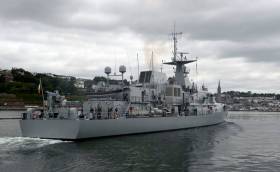Displaying items by tag: MigrantRefugees
#NavalService- LÉ James Joyce is currently in the Mediterranean having departed Cork Harbour almost a week ago to replace the first Irish Naval Service ship to be deployed to Operation Sophia during this year, writes Jehan Ashmore.
Prior to the departure last Friday, Chief of Staff of the Defence Forces Vice Admiral Mark Mellett DSM, bid farewell to the crew LÉ James Joyce. The Offshore Patrol Vessel was berthed at the oil wharf at Haulbowline Naval Base in preparation for the overseas deployment.
In recent days, LÉ James Joyce was offshore of Algeria and today is heading further eastward towards the cental Mediterranean. The second of the OPV90 class offshsore patrol vessels will takeover duties from LÉ Samuel Beckett which in March began deployment for Operation Sophia.
Last year the OPV80 class LÉ Niamh was deployed as the first Irish Naval Service ship in Operation Sophia, an EU led mission designed to disrupt people-trafficking in Libya in addition to saving the lives of migrants.
LÉ James Joyce is under the Command of Lieutenant Commander Martin Brett. A total of 57 personnel make up the crew from members of the Defence Forces. They will be on extended deployment since receiving notice that they would be sailing to assist Operation Sophia which involves other navies from participating EU member states.






























































